Editor’s Note: A version of this story appeared in CNN’s Meanwhile in China newsletter, a three-times-a-week update exploring what you need to know about the country’s rise and how it impacts the world. Sign up here.
Hong Kong
CNN
—
When Xi Jinping came to power in 2012, he inherited a country at a crossroads.
Outwardly, China seemed an unstoppable rising power. It had recently overtaken Japan as the world’s second-largest economy, the country still basking in the afterglow of the dazzling 2008 Beijing Summer Olympics.
But deep within the high walls of Zhongnanhai, the leadership compound where Xi spent time as a child visiting his late father Xi Zhongxun, a liberal-minded vice premier, China’s new leader saw a country in crisis.
Rampant corruption plagued the Communist Party and stoked popular discontent, chipping away at the legitimacy of a regime Xi’s father helped bring to power. The quest to get rich over decades of economic reform created a gaping wealth gap and hollowed out the official socialist ideology, fueling a crisis of faith. And as the Arab Spring toppled dictators in the Middle East, the rise of social media in China offered a rare space for public dissent, amplifying calls for social justice and political change.
Xi took these perceived challenges head on. Born a “princeling” – the offspring of revolutionary heroes who founded Communist China – the Chinese leader saw himself as savior, entrusted by the party to steer it away from threats to its survival.
But instead of following in the reformist footsteps of his father, Xi opted for a path of total control. Combining the old authoritarian playbook and new surveillance technology, he has eliminated his rivals, tightened his grip on the economy and made the party omnipresent in China – embedding his own cult of personality in daily life.
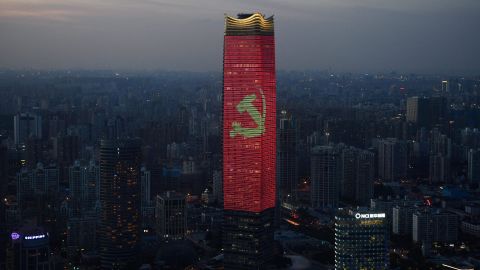
Xi also touted the “Chinese dream” of national rejuvenation, offering a tempting vision to restore China to its past glory and reclaim its rightful place in the world.
“Xi Jinping sits on top of the party, the party sits on top of China, and China sits on top of the world. That’s basically the program,” said Richard McGregor, a senior fellow at the Lowy Institute in Australia.
Ten years on, Xi’s China is richer, stronger and more confident than ever, yet it is also more authoritarian, inward-looking and paranoid than it has been in decades. It has bolstered its international clout, at the expense of its relations with the West and many of its neighbors.
At a key party congress beginning on Sunday, Xi is poised to be appointed to a norm-breaking third term. It will be his coronation as China’s most powerful leader since Chairman Mao Zedong, paving the way for potential lifelong rule.
But as Xi grapples with a sharp economic downturn, growing frustration with his uncompromising zero-Covid policy and surging tensions with the United States and its allies, the sense of crisis that beset his rise to power has continued to haunt him, and is set to shape his rule in the years – if not decades – to come.
Xi saw the party’s crisis up close during his ascent to the top in 2012, when a sensational scandal brought down a prominent political rival and threatened to derail the leadership handover.
Bo Xilai, a fellow “princeling” and charismatic leader of the mega city of Chongqing, was vying for promotion into the top leadership when his police chief attempted to defect to a US consulate, accusing Bo of trying to cover up his wife’s murder of a British businessman. Party leaders feuded over how to deal with the fallout. Eventually, Bo was investigated and expelled from the party weeks before the five-yearly power reshuffle. Bo and his wife are today both serving life in prison.

Having risen through the ranks in the bustling coastal provinces during China’s reform and opening up, Xi would have seen no shortage of local corruption. But the blatant abuse of power and deep rifts at the very top of the leadership exposed in Bo’s scandal likely aggravated Xi’s sense of peril for the party’s survival.
“Our party faces many grave challenges and there are many pressing problems within the party that need to be solved, in particular corruption,” Xi said in his first speech hours after being appointed the top leader.
Within weeks, he launched the most brutal and long-lasting “war on graft” the party had ever seen. The sweeping purges targeted not only the corrupt, but also Xi’s political enemies, including powerful leaders who were accused of plotting a coup with Bo to seize power.
The crackdown instilled discipline, loyalty and a culture of fear, stifling opposition as Xi moved to amass power into his own hands. He styled himself as a strongman, eschewing the collective rule that was alleged to have exacerbated factionalism under his comparably weak predecessor Hu Jintao. In just four years, Xi asserted himself as the “core” of the party leadership, demanding its 96 million members to “unify their thinking, willpower and action” around him.
“(Xi) thinks the only instrument with which he can rule China at home and make gains abroad is a unified, strong, and powerful Communist Party. So he has made it his mission to strengthen the party under his rule,” said McGregor at the Lowy Institute. “He’s both strengthened himself, and he’s strengthened the party as a vehicle for himself.”
Consolidating the party from within was only part of his plan. Xi also set out to fortify the party’s grasp over the country. “Government, the army, society and schools, east, west, south, north and center – the party leads them all,” he said at the party congress in 2017.
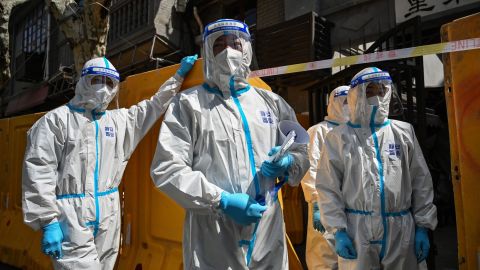
Under Xi, the party reasserted itself in all aspects of life. It revitalized once-dormant grassroots party cells and set up new branches in private and foreign companies. It tightened its grip on the media, education, religion and culture, strangled civil society, and unleashed harsh crackdowns on Xinjiang and Hong Kong.
Xi also ramped up the party’s control of the economy, especially its once-vibrant private sector. His sweeping regulatory crackdown brought tycoons to heel and wiped out trillions of dollars of market value from Chinese firms.
In the online sphere, extensive censorship and real-life retaliation tamed social media. Instead of serving as a catalyst for social and political reforms, it became an amplifier for party propaganda and a breeding ground for nationalism.
The pervasive social control reached new heights during the pandemic. In the name of fighting Covid, 1.4 billion Chinese citizens lost their freedom of movement to the whims of the party and the prowess of the surveillance state. Cities across China are trapped in rolling, draconian lockdowns, sometimes for months on end, with millions of people confined to their homes or massive quarantine camps.
For Xi, safeguarding the party’s primacy is a painful lesson drawn from the Cultural Revolution, when the Communist establishment was attacked by Mao’s “red guards” and lost control over society.
Hundreds of thousands died in the turmoil, including Xi’s half-sister who was persecuted to death. Xi’s father was purged and tortured. Xi himself was incarcerated, publicly humiliated and sent to hard labor in an impoverished village at age 15.
“Arguably, his emphasis on party authority, and stopping individuals who disagree with the party from criticizing (it), is a result of his phobia of chaos because of what he saw happened to himself, his mother, his father and siblings,” said Joseph Torigian, an expert on Chinese politics at American University and author of an upcoming biography on the elder Xi.

Many Chinese who survived the Cultural Revolution – including some party elites – came away with a conviction to prevent a similar catastrophe from happening again, China needed the rule of law, constitutionalism and protection of individual rights. But Xi arrived at a very different conclusion.
“(He) believed that to achieve political order you needed to have a powerful leader, a powerful party, not creating a system in which people had rights that went too far, because they would only abuse them and hurt other individuals,” Torigian said.
So instead of turning against the party, Xi devoted himself to it. In interviews with state media, Xi spoke of how his seven years as a “sent-down youth” toughened him up and strengthened his resolve to serve the party and the people. “I was distilled and purified, and felt like a completely different man,” he told the People’s Daily in 2004.
Xi’s obsession for control was also shaped by the trauma of the collapse of the Soviet Union, which he has repeatedly cited as a cautionary tale for the Chinese Communist Party.
“Why did the Soviet Union disintegrate? Why did the Soviet Communist Party collapse? An important reason was that their ideals and beliefs had been shaken,” Xi told senior officials in a speech months after taking the helm of the party.
To address China’s own crisis of faith, Xi cracked down on religion, reinvigorated the party’s official Marxist ideology and promoted his own eponymous philosophy. “Xi Jinping Thought on Socialism with Chinese Characteristics for a New Era” is enshrined in the party charter and dominates party speeches and meetings. It also permeates billboards, newspaper front pages and cinema screens, and is taught in classrooms across the country – to children as young as 7.
At the center of “Xi Jinping Thought” is the notion of the Chinese dream: the “great rejuvenation of the Chinese nation” – a vision Xi unveiled just weeks after coming to power.
It has since become a hallmark of his rule, shaping many of his policies at home and abroad.
“Xi Jinping is a man with a mission. He believes that he knows the ways to take China to the promised land of national rejuvenation,” said Steve Tsang, director of the China Institute at SOAS University of London.
“He is going back to his mythical visions of Chinese history, when China was the greatest civilization and country in the world. And the rest of the world (should) just respect, admire and follow the leadership of China.”
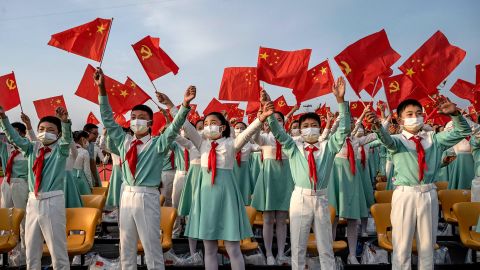
To be sure, many Chinese are proud of their country’s achievements. Under Xi, China declared an end to extreme poverty, modernized its military, emerged as a leader in next-generation technology and greatly expanded its global influence. It is striving to become the dominant power in space, commands the world’s largest navy, and makes its weight felt as an emerging superpower.
For others, Xi’s Chinese dream has turned into their living nightmare. In the country’s far west, Muslim minorities are arbitrarily incarcerated, forcibly assimilated and closely surveilled. In Hong Kong, pro-democracy supporters saw their freedom and hope crushed in a city changed beyond recognition. Across the country, numerous rights lawyers, activists, journalists, professors and businessmen are languishing in jail, or silenced by fear. In Xi’s eyes, they are all perceived threats to his quest for a strong and unified nation, and thus must be remolded or eliminated.
But increasingly, the sheen of the Chinese dream is coming off for ordinary people, too – young professionals who chose to “lie flat” in the face of intense pressure, depositors who lost their life savings in rural banks, homebuyers who refused to pay mortgages on unfinished homes, as well as business owners, laid-off workers and residents pushed to the brink by Xi’s relentless zero-Covid lockdowns. Some of them might have previously rooted for Xi and his vision, but are now paying the price for his policies.
The most disillusioned are seeking a way out. “Run philosophy” has become a Chinese buzzword, advocating emigration to escape what some see as a doomed future under Xi’s rule. Xi has repeatedly touted that China is rising and the West is in decline – a conviction strengthened by America’s political polarization, and his belief that China’s superior political model has enabled it to fight Covid better than Western democracies. But the growing number of disciples of “run philosophy” is an outright rejection of that narrative, showing many Chinese have no faith in his promise to make China great again.
Underpinning Xi’s Chinese dream is a bitter sense of resentment toward the West, rooted in the nationalistic narrative that before the party took power, China suffered a “century of humiliation” at the hands of foreign powers and was invaded, carved up, occupied and weakened.
In recent years, American measures to counter China’s rising influence has only reinforced its sense of being under siege from Western powers, McGregor said.
“It has a visceral, emotional appeal in China. It’s very powerful. I think Xi understands that and he intends to harness that to his own ends,” he said.
As a leader-in-waiting, Xi had already shown a strong disdain for foreign criticism of China. “There are some foreigners with full bellies who have nothing better to do than point fingers at us,” Xi told members of the Chinese community in Mexico on a visit as vice-president in 2009. “China does not export revolution, hunger or poverty. Nor does China cause you headaches. Just what else do you want?”
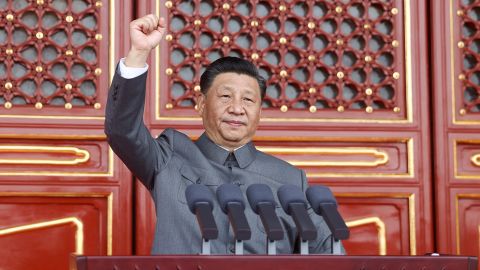
But Xi’s starkest warning to the West came last summer, when he presided over a grand celebration marking the party’s centenary. Standing on top of Tiananmen, or the Gate of Heavenly Peace, the towering entrance to the Forbidden City palace of imperial China, Xi declared the Chinese nation will no longer be “bullied, oppressed or subjugated” by foreign powers. “Anyone who dares to try, will find their heads bashed bloody against a great wall of steel forged by over 1.4 billion Chinese people,” he said to thundering applause from the crowd.
Since coming to power, Xi has repeatedly warned against the “infiltration” of Western values such as democracy, press freedom and judicial independence. He has clamped down on foreign NGOs, churches, Western movies and textbooks – all seen as vehicles for undue foreign influence.
Abroad, Xi embarked on an aggressive foreign policy. “Xi thinks this is China’s moment. And to seize that moment, he has to be assertive and take risks,” McGregor said.
Under Xi, China has openly competed for global clout with the United States, leveraging its economic heft to gain geopolitical influence. Its ties with the West are at their most fraught since the 1989 Tiananmen Square massacre – and they were further soured by Beijing’s tacit support for Moscow following the Russian invasion of Ukraine.
Xi and his Russian counterpart Vladimir Putin share a deep suspicion and hostility toward the US, which they believe is bent on holding China and Russia down. They also share a vision for a new world order – one that better accommodates their nations’ interests and is no longer dominated by the West.
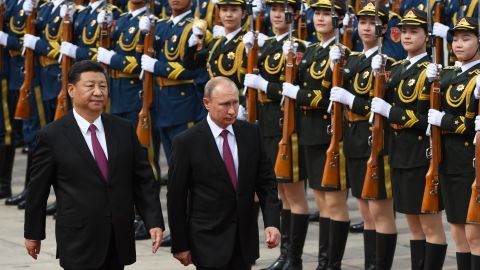
But it remains to be seen how many countries are willing to join that alternative perspective. Views of China have grown more negative during Xi’s decade in power across many advanced economies, and in some, unfavorable views reached record highs in recent years.
Beijing’s sweeping claims of sovereignty have also antagonized many of its neighbors in the region. China built and militarized islands in the South China Sea, raised military tensions over a disputed island chain with Japan, and engaged in bloody border conflicts with India. It has also ramped up military intimidation of Taiwan, a self-governing democracy Xi has vowed to “reunify” with the mainland.
For its part, the US has awakened to the competition with China, and is working with allies and like-minded partners to take a raft of measures against Beijing on geopolitics, trade and technology.
That difficult international environment, along with the toll of zero-Covid and the economic headwinds, poses a big challenge for Xi in the years ahead.
But for the coming week, the party congress will be all about celebrating Xi’s victory. According to the party’s most updated official history, Xi has brought China “closer to the center of the world stage than it has ever been.”
Mao may have founded Communist China. But according to the party’s narrative, it is Xi who will lead the country to its rebirth as the new global superpower. Whether he can succeed will have a profound impact on the world.

